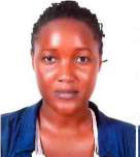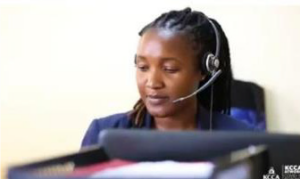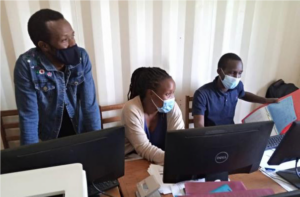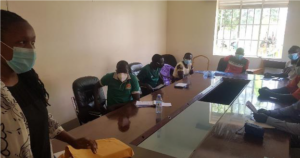 |
Elizabeth B. KatanaAdvanced Field Epidemiology (UPHFP), MSc CEB Host Site: Kampala Capital City Authority,Directorate of Public Health and Environment (City Hall, Kampala)
|
|||
ABOUT THE FELLOWI hold a Master of Science in Clinical Epidemiology and Biostatistics from the Clinical Epidemiology Unit, School of Medicine, College of Health Sciences at Makerere University. During the two years of this fellowship, I have learned and built skills in field epidemiology and community engagement in both rural and urban settings. I have appreciated the role of several statistical methods and research design approaches in field epidemiology, public health, and clinical practice. Some of these approaches included mapping, sampling, project management, policy reviews and development, study designs, research methods, data collection techniques, data management, scientific writing, and reporting. I prepared articles for publication and dissemination in the Ministry of Health quarterly epidemiological bulletin, technical reports, and manuscripts. I have gained experience in organizing meetings and trainings, conducting epidemiological investigations and quality improvement projects, and enriched my skills and expertise in abstraction, collection, cleaning, analyzing and triangulating survey data. Before joining the fellowship, I participated in field epidemiological investigations and support supervision for antimicrobial resistance (AMR) surveillance at regional referral hospitals in Eastern Uganda with the Infectious Diseases Institute-Global Health Security Programme (IDI-GHSP). I also participated in Tuberculosis surveillance including community and hospital investigations for Drug-Resistant Tuberculosis in the Karamoja region and monitoring and evaluation of iCCM activities and reporting functions of Village Health Teams in Nakapiripirit district while working with Doctor’s with Africa (CUAMM). Achievements at the Host Site
Fellowship program specific achievements
Conference Presentations
Publications and manuscripts written :
Summary of Epidemiological Study:Title: Use of a Toll-free Call Center for COVID-19 Responseand Continuity of Essential Services duringLockdown, Greater Kampala, Uganda, 2020 1.Katana1,2*, A Ndyabakira1,2, D.N. Gonahasa1, R. Migisha1, G. Amanya1, A. Byaruhanga1, I. Chebrot2, C. Oundo2, D. Kadobera1, L.Bulage1, AR Ario1,3, DA Okello2, JR Harris4; 1Uganda Public Health Fellowship Program, Ministry of Health, Kampala, Uganda, 2Directorate of Public Health and Environment, Kampala Capital City Authority, Kampala Uganda, 3Uganda National Institute of Public Health, Ministry of Health, Kampala, Uganda, 4Division of Global Health Protection, US Centers f or Disease Control and Prevention, Kampala, Uganda Background: Establishment of a call center during public health emergencies is essential in reducing unnecessary calls to emergency telephone systems and providing relevant information to the public. Following the introduction of COVID-19 in Uganda, a total lockdown was initiated on March 30 and lifted in stages through June 30, 2021. On March 25, a toll-free call center with two hotlines was set up at Kampala Capital City Authority to respond to public concerns about COVID-19 and the lockdown. Call-related data were entered into a database. We documented the set-up and use of the call center and key concerns raised by the public during COVID-19 lockdown. Methods: We abstracted data on incoming calls between March 25-June 30, 2020 from the database. We summarized the call data into categories and conducted descriptive analysis of the public concerns raised during the different phases of the lockdown. Results: Of the 10,167 calls made, 6,578 (65%) were about health services access, 786 (8%) about social services access, and 1,375 (14%) about COVID-19 concerns. Among the 6,578 calls about access to health services, 2,152 (33%) were requests for ambulances for non-COVID emergencies, 1,155 (18%) were about persons stranded at health facilities, and 1,004 (15%) were about mothers in labor. Among the 786 calls about social services, 405 (52%) were requests for food and relief items and 158 (20%) were about price hikes for basic goods. Fifty-three percent of the 1,375 calls about COVID-19 response were seeking COVID-19 disease-related information and 360 (26%) were reporting COVID-19 suspected cases. There were no calls about COVID-19 emergencies. Conclusion:The toll-free call center was used by the public during the COVID-19 response. Calls indicated gaps in health and social services associated with the lockdown. Continuity of essential services amidst an epidemic-related lockdown should be planned accordingly. Key words: call center, hotline, Uganda, COVID-19
Key lessons learnt during the fellowship
Next Steps
Pictorial
|
||||
Sign in
Sign in
Recover your password.
A password will be e-mailed to you.



